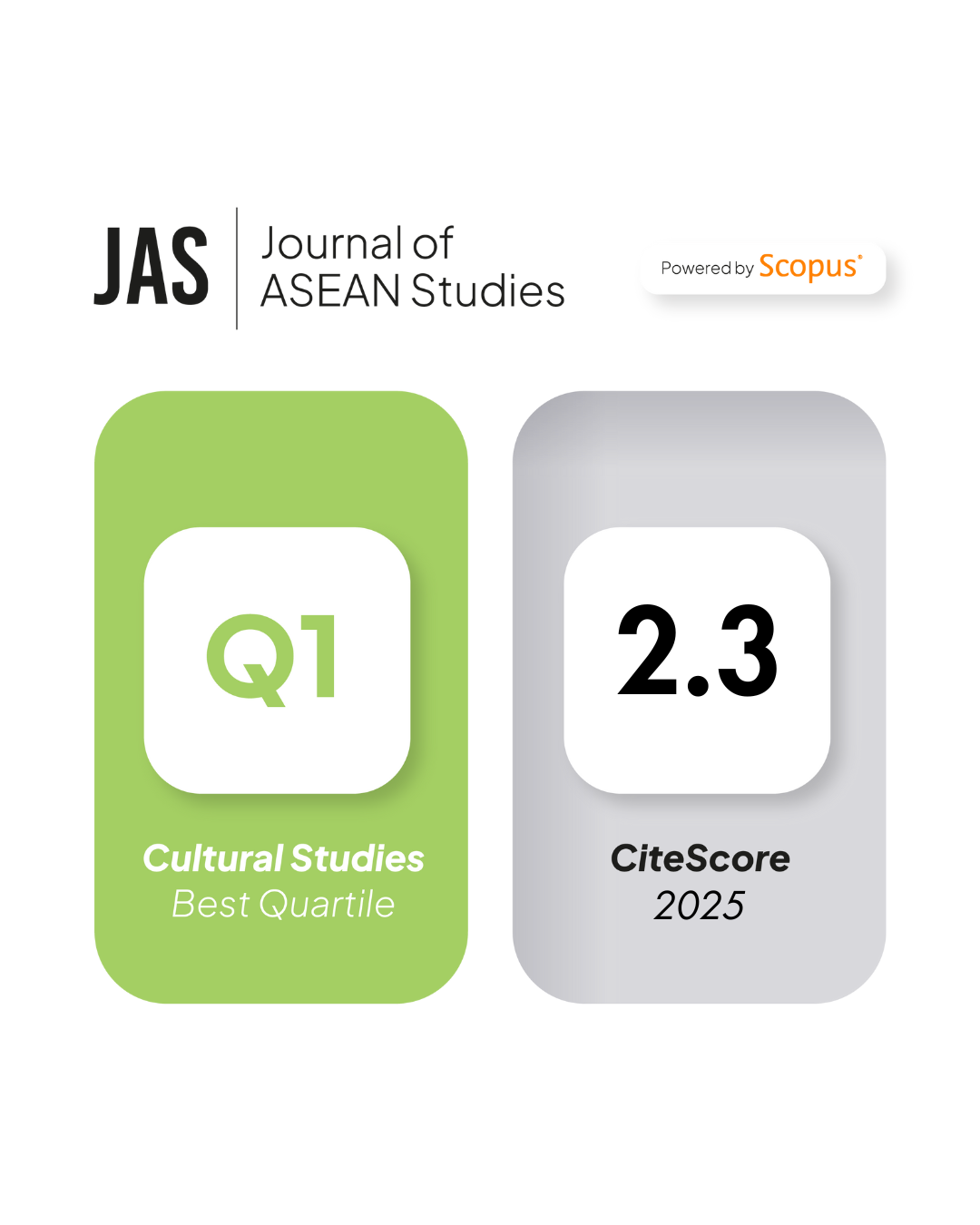Evaluating the Impact of ESG Practices on Company Values in ASEAN-5 Region: The Moderating Roles of Financial Flexibility and Capital Structure
DOI:
https://doi.org/10.21512/jas.v13i1.12072Keywords:
company value, ESG , financial flexibility, capital structureAbstract
This research examined the influence of environmental, social, and governance (ESG), financial flexibility, and capital structure on company value. Company value was measured using Tobin's Q, ESG was evaluated through the ESG score from Thomson Reuters, financial flexibility was assessed through a financial flexibility proxy, and capital structure was measured using the debt-to-equity Ratio (DER). The research also employed control variables, including return on assets, firm size, firm age, growth, inflation, gross domestic product, and COVID-19. The purposive sampling method was employed to analyze secondary data from 101 companies in the ASEAN-5 region (Indonesia, Malaysia, the Philippines, Singapore, and Thailand) from 2016 to 2022. The results indicate that ESG positively impacts a company's value. Financial flexibility and capital structure have a negative effect on company value. The control variables that significantly impact ROA, size, growth, GDP, and COVID-19, while age and inflation do not have a significant effect. The relevance of this research in finance lies in strengthening the relationship between non-financial factors (ESG) and a company's financial performance, as well as in understanding how managing financial flexibility and capital structure can support companies' sustainability and long-term value.
References
Abedifar, P., Bouslah, K., Neumann, C., & Tarazi, A. (2023). Resilience of environmental and social stocks under stress: Lessons from the COVID-19 pandemic. Financial Markets, Institutions and Instruments, 32(2), 23–50. https://doi.org/10.1111/fmii.12166
Adeneye, Y., & Kammoun, I. (2022). Real earnings management and capital structure: Does environmental, social and governance (ESG) performance matter? Cogent Business and Management, 9(1). https://doi.org/10.1080/23311975.2022.2130134
Ali, S., Fei, G., Ali, Z., & Hussain, F. (2021). Corporate governance and firm performance: Evidence from listed firms of Pakistan. Journal on Innovation and Sustainability RISUS, 12(1), 170–187. https://doi.org/10.23925/2179-3565.2021v12i1p170-187
Arifah, J. (2024). The effect of environmental, social, and governance performance on firm value with firm size as a moderating variable. Eduvest - Journal of Universal Studies, 4(8), 7416–7433. https://doi.org/10.59188/eduvest.v4i8.1516
ASEAN. (2020, April 29). Report on promoting sustainable finance in ASEAN. ASEAN Working Committee on Capital Market Development. https://asean.org/wp-content/uploads/2022/09/Report-on-Promoting-Sustainable-Finance-in-ASEAN-for-AFCDM-AFMGM.pdf
Aydoğmuş, M., Gülay, G., & Ergun, K. (2022). Impact of ESG performance on firm value and profitability. Borsa Istanbul Review, 22, S119–S127. https://doi.org/10.1016/j.bir.2022.11.006
Bae, J. C., Yang, X., & Kim, M. I. (2021). Esg and stock price crash risk: Role of financial constraints. Asia‐Pacific Journal of Financial Studies, 50(5), 556-581. https://doi.org/10.1111/ajfs.12351
Bag, D., & Mohanty, S. (2021). Impact of ESG factors on emerging market stock returns. The Journal of Impact and ESG Investing, 2(2), 138-147.
Bawai, R., & Kusumadewi, H. (2021). Effect of Corporate Governance, Firm Characteristic, Disclosure of Corporate Social Responsibility (CSR) on Firm Value. Jurnal Economia, 17(1), 34–48.
Bui, T. N., Nguyen, X. H., & Pham, K. T. (2023). The effect of capital structure on firm value: A study of companies listed on the vietnamese stock market. International Journal of Financial Studies, 11(3). https://doi.org/10.3390/ijfs11030100
Ding, D. K., & Beh, S. E. (2022). Climate change and sustainability in ASEAN countries. Sustainability, 14(2), 1–17. https://doi.org/10.3390/su14020999
Dowling, J., & Pfeffer, J. (1975). Organizational legitimacy: Social values and organizational behavior. The Pacific Sociological Review, 18(1), 122-136. https://doi.org/https://doi.org/10.2307/1388226
Duque-Grisales, E., & Aguilera-Caracuel, J. (2021). Environmental, social and governance (ESG) scores and financial performance of multilatinas: Moderating effects of geographic international diversification and financial slack. Journal of Business Ethics, 168, 315–334. https://doi.org/10.1007/s10551-019-04177-w
E-Vahdati, S., Wan-Hussin, W. N., & Mohd Ariffin, M. S. (2022). Sustainability performance and board compensation in Japan and ASEAN-5 countries. Borsa Istanbul Review, 22, S189–S199. https://doi.org/10.1016/j.bir.2022.12.004
Gao, M., & Geng, X. (2024). The role of ESG performance during times of COVID-19 pandemic. Scientific Reports, 14, 2553. https://doi.org/10.1038/s41598-024-52245-7
Ghardallou, W. (2022). Corporate sustainability and firm performance: The moderating role of CEO education and tenure. Sustainability, 14(6), 3513. https://doi.org/10.3390/su14063513
GRI ASEAN & Centre for Governance and Sustainability. (2022). Climate reporting in ASEAN state of corporate practices. https://www.globalreporting.org/media/oujbt3ed/climate-reporting-in-asean-state-of-corporate-practices-2022.pdf
Guo, Z., Hou, S., & Li, Q. (2020). Corporate social responsibility and firm value: The moderating effects of financial flexibility and r&d investment. Sustainability, 12(20), 8452. https://doi.org/10.3390/su12208452
Hanasa, N., & Lubis, A. W. (2023). Financial flexibility and health sector firm performance in ASEAN-5 Countries : Moderate role of directors with MD degree. In Proceedings of the 7th Global Conference on Business, Management, and Entrepreneurship (GCBME 2022) (pp.112–125). https://doi.org/10.2991/978-94-6463-234-7_12
Hannawanti, H., & Naibaho, E. A. B. (2021). Likuiditas, profitabilitas dan struktur modal terhadap nilai perusahaan dengan variabel moderasi CSR. Ekonomi, Keuangan, Investasi dan Syariah (EKUITAS), 3(2), 145–155. https://doi.org/10.47065/ekuitas.v3i2.1105
Mahmood, A. N., Arslan, H. M., Younas, Z. I., Komal, B., Ali, K., & Mubeen, M. (2023). Understanding the dynamics of capital structure, corporate governance, and corporate social responsibility in high- low leveraged US and Chinese firms. Environmental Science and Pollution Research, 30(16), 46204–46221. https://doi.org/10.1007/s11356-022-24843-3
MIA. (2022). Driving quality of financial reporting. Malaysian Institute of Accountants.
Niu, S. J., Park, B. Il, & Jung, J. S. (2022). The Effects of Digital Leadership and ESG Management on Organizational Innovation and Sustainability. Sustainability, 14(23), 15639. https://doi.org/10.3390/su142315639
Phang, R., & Chia, Y. (2024). Sustainability and the sunlight of disclosure: ESG disclosure in three Asian financial centres. Review of European, Comparative and International Environmental Law, 33(2), 209–223. https://doi.org/10.1111/reel.12554
Pimpa, N. (2025). Environmental, social, and governance communication and actions in Thailand : Opportunities and challenges. Frontiers in Communication, 10, 1–17. https://doi.org/10.3389/fcomm.2025.1543893
Pohan, H. L. M. (2023). Penjelasan perbedaan antara CSR dan ESG. https://crmsindonesia.org/publications/mengenal-esg-bagian-1-latar-belakang-dan-pengertian-esg
Prekazi, Y., Bajrami, R., & Hoxha, A. (2023). The impact of capital structure on financial performance. International Journal of Applied Economics, Finance and Accounting, 17(1), 1–6. https://doi.org/10.33094/ijaefa.v17i1.1002
Purnamasari, D. I., & Fauziah, M. R. (2022). The impact of firm size, capital structure and dividend policy on firm value during Covid-19 pandemic. Journal of Accounting Science, 6(2), 124–133. https://doi.org/10.21070/jas.v6i2.1610
Rahman, H. U., Zahid, M., & Al-Faryan, M. A. S. (2023). ESG and firm performance: The rarely explored moderation of sustainability strategy and top management commitment. Journal of Cleaner Production, 404, 136859. https://doi.org/10.1016/j.jclepro.2023.136859
Robiyanto, R., Nugroho, B. A., Handriani, E., & Frensidy, B. (2023). Measuring the effectiveness of ASEAN-5 initiatives from emerging market portfolio’s perspective. Cogent Business and Management, 10(1). https://doi.org/10.1080/23311975.2023.2167292
Sadiq, M. (2020). The impact of environmental, social and governance index on firm value: Evidence from Malaysia. International Journal of Energy Economics and Policy, 10(5), 555–562. https://doi.org/10.32479/ijeep.10217
Sadiq, M., Singh, J., Raza, M., & Mohamad, S. (2020). The impact of environmental, social and governance index on firm value: Evidence from Malaysia. International Journal of Energy Economics and Policy, 10(5), 555–562. https://doi.org/10.32479/ijeep.10217
Teng, X., Chang, B. G., & Wu, K. S. (2021). The role of financial flexibility on enterprise sustainable development during the COVID-19 crisis-A consideration of tangible assets. Sustainability, 13(3), 1245. https://doi.org/10.3390/su13031245
United Nations. (n.d.). Sustainable Development Goals – 17 Goals to Transform Our World. United Nations. https://sdgs.un.org/goals
Vo, M. T. (2021). Capital structure and cost of capital when prices affect real investments. Journal of Economics and Business, 113, 105944. https://doi.org/10.1016/j.jeconbus.2020.105944
Wong, W. C., Batten, J. A., Ahmad, A. H., Mohamed-Arshad, S. B., Nordin, S., & Adzis, A. A. (2021). Does ESG certification add firm value? Finance Research Letters, 39, 101593 https://doi.org/10.1016/j.frl.2020.101593
World Bank. (2024). World development indicator. World Bank.
Wu, W., Alkaraan, F., & Le, C. (2023). The moderating effects of corporate governance and investment efficiency on the nexus between financial flexibility and firm performance. Journal of Financial Reporting and Accounting. https://doi.org/10.1108/JFRA-05-2023-0234
Yahya, H. (2023). The role of ESG performance in firms’ resilience during the COVID-19 pandemic: Evidence from Nordic firms. Global Finance Journal, 58, 100905. https://doi.org/10.1016/j.gfj.2023.100905
Yunica, A. S., & Rokhim, R. (2023). Unveiling the hidden power : How ESG enhanced Indonesian companies ’ financial flexibility. Jurnal Siasat Bisnis, 27(2), 171–187. https://doi.org/10.20885/jsb.vol27.iss2.art4
Zahid, R. M. A., Saleem, A., & Maqsood, U. S. (2023). ESG performance, capital financing decisions, and audit quality: Empirical evidence from Chinese state-owned enterprises. Environmental Science and Pollution Research, 30, 44086–44099. https://doi.org/10.1007/s11356-023-25345-6
Zhang, D., & Liu, L. (2022). Does ESG Performance Enhance Financial Flexibility? Evidence from China. Sustainability, 14(18), 11324. https://doi.org/10.3390/su141811324
Downloads
Published
How to Cite
Issue
Section
License
Copyright (c) 2025 Eduard Ary Binsar Naibaho, Apriani Simatupang, Zalfa Nadira

This work is licensed under a Creative Commons Attribution-NonCommercial 4.0 International License.






















